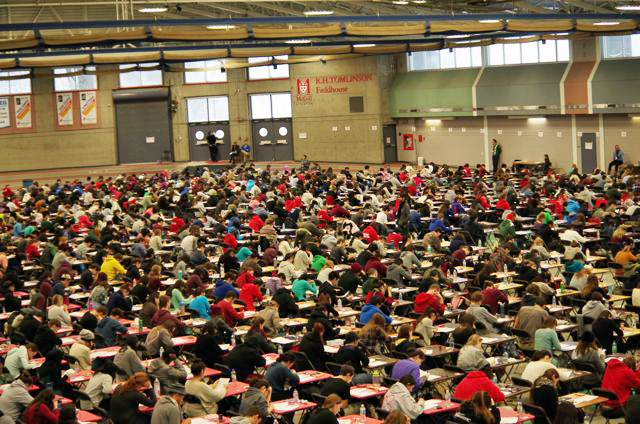Despite professors’ efforts to be objective, grading students can involve personal bias. Recently, certain McGill departments have adopted anonymous grading, that is grading papers and midterms without knowing the identity of the student, as a way of combating this bias. Anonymous grading is an educational policy that all McGill faculties should consider implementing.
Perhaps the most appealing case for anonymous grading is its potential to begin dismantling institutional racism in education by reducing bias in grading. While not all professors and instructors at McGill are explicitly racist or biased toward students of a visible minority, it is difficult for anyone to completely rid themselves of the implicit biases that are informed and shaped by the unequal society that we live in. Simply being aware of these biases is not enough: Until institutional racism and sexism are dismantled entirely, implicit biases will continue to manifest and perpetuate societal inequities.
Regardless of one’s personal views, there is no denying that stereotypes can subconsciously influence one’s actions. For instance, one study revealed the bias of elementary school pre-service teachers, who graded students with migrant backgrounds significantly worse than students without a migrant background. Another study found that students with stereotypically Black names, such as ‘Darnell’ or ‘DeShawn’, tended to receive more discipline for the same action as students with stereotypically white names like ‘Jake’ or ‘Connor.’
Similarly, other experimental studies have shown that teachers discriminate against female students, Black students, less attractive students, less liked students, and students with less appealing surnames.
White men have historically been the original scholars of many disciplines in the arts, such as philosophy and political science; despite significant gender equality progress in education, the former association between men and intellectual success is likely still present in one’s implicit attitudes. One paper by philosopher Jennifer Saul examining implicit bias and women in philosophy explained that if grading is not anonymous, men are more likely to be given higher grades than women for the same quality of work. An individual’s implicit biases can often lead them to behaviour that disadvantages or privileges certain groups of people over others: Disregarding the impact of these attitudes allows for institutional racism and sexism to persist.
To see it another way, in situations where the grader is familiar with their students, graders could be more susceptible to biased grading. Anonymous grading would reduce the ‘halo effect’—the tendency for one’s impression of someone to influence one’s opinion or judgement in another, unrelated area, and would also reduce the bias against students who have a poor precedent of prior work.
The process of anonymous grading entails nothing but small format adjustments: Students put their student ID number in place of their names on assignments, and submit papers without deviating from the usual submission procedures on MyCourses. The McGill Faculty of Law has been using this policy for many years, and The Association of Graduate Students Employed at McGill (AGSEM) and Post Graduate Students’ Society (PGSS) passed motions in 2014 in support of adopting an anonymous grading policy. Very little interest has been taken in the policy in the years since.
Under an anonymous grading scheme, receiving personalized feedback on assignments would still be possible. Instructors grade the anonymous assignment, and then submit feedback after assigning the grade. Alternatively, assignments could be submitted with the students’ names and professors could obscure the name until grading is complete, should the student ID system be a burden to graders. Professors might even choose to reveal the identity of the student after they have marked it in order to provide reflections on the student’s improvement.
With the policy of anonymous grading, the grader clearly separates the student’s personal attributes from their work and effort which is exactly the way grading should be done.









